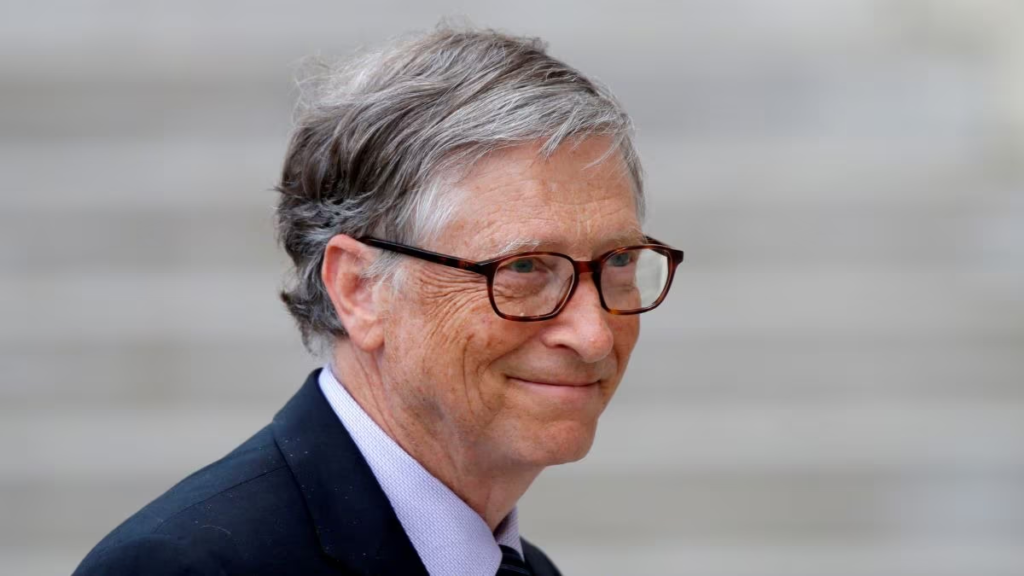Bill Gates’ recent remarks on India have ignited a heated debate, particularly on social media, where many have expressed their discontent with his choice of words.
During a podcast discussion with Reid Hoffman, the Microsoft co-founder described India as “a kind of laboratory to try things,” which was intended to highlight the country’s role in piloting global development initiatives.
However, this statement has been met with widespread outrage, with many interpreting it as disrespectful and implying that India is merely a testing ground for Western interests. The controversy raises broader questions about perceptions of developing countries, the role of international foundations, and the complexities of global aid and innovation.
The Controversial Remarks: What Bill Gates Said
During the podcast, Gates praised India’s progress in areas like health, education, and nutrition while pointing out the challenges that still exist.
He remarked, “India is an example of a country where there’s plenty of things that are difficult there—the health, nutrition, education is improving—and they are stable enough and generating their own government revenue enough that it’s very likely that 20 years from now people will be dramatically better off. It’s kind of a laboratory to try things that then when you prove them out in India, you can take to other places.”
Bill Gates further mentioned that the Bill and Melinda Gates Foundation’s largest non-US office is in India, and that the country is crucial to many of the Foundation’s pilot programs. These initiatives, ranging from health interventions to educational reforms, are often tested in India before being expanded globally.
Read : Bill Gates Secretly Donates $50 Million to Support Kamala Harris in Polls
However, the use of the word “laboratory” struck a nerve. For many Indians, it evoked a sense of being treated as experimental subjects rather than equal partners in global development.
Read : Steve Ballmer: Once Bill Gates’ Assistant, Now Richer Than Bill Gates
This interpretation fueled the backlash on social media, where Gates was accused of disrespecting India and treating its population as guinea pigs for Western-led projects.
Social Media Backlash: Voices of Dissent and Support
The outrage was palpable across platforms like X (formerly Twitter). One user expressed frustration by writing, “India is a laboratory, and we Indians are guinea pigs for Bill Gates. This person has managed everyone from the Government to opposition parties to the media.
Bill Gates about India: "It's kind of a laboratory to try things that then… when you prove them out in India, you can take to other places. And so our biggest non-U.S. office for the foundation is in India, and then most number of pilot rollout things we're doing anywhere in… pic.twitter.com/JMjuWzRExm
— Camus (@newstart_2024) November 30, 2024
His office operates here without FCRA, and our education system has made him a hero! I don’t know when we will wake up!” This comment reflects a deep-seated skepticism towards foreign interventions and the perception that India is often seen as a testing ground for projects that benefit other countries more than its own citizens.
Another user highlighted concerns about the ethical implications of Gates’ remarks, suggesting that successful pilot programs in India might primarily serve Western interests: “The human beings in India are samples for Bill Gates’ laboratory to try things, and once they are proven to be effective, taken to the US. This clip doesn’t sound right no matter in what context you hear this. That’s why research backed by governments can often have vested interests.”
The criticism also tapped into broader anxieties about foreign influence and the motivations behind international aid and development programs. Some users referenced similar concerns raised by figures like Elon Musk, who has previously questioned the transparency and ethics of certain global initiatives.

However, not all responses were negative. Some defended Bill Gates, arguing that his comment was taken out of context and misinterpreted. One user pointed out, “I genuinely don’t understand this conspiracy theory attitude against Bill Gates in India. There’s no guinea pig-style experiments for vaccines happening in India, period!”
This perspective suggests that the backlash might stem from a misunderstanding of Gates’ intentions and the role of the Foundation’s work in India.
India’s Role in Global Development: Opportunities and Challenges
At the heart of the controversy is a broader discussion about India’s position in the global development landscape. Gates’ comments, though controversial, reflect a reality: India has become a key player in piloting and scaling up innovative solutions to global challenges.
Its large population, diverse socio-economic landscape, and rapid development make it an ideal testing ground for initiatives that can later be adapted to other countries.
India’s involvement in global health and development projects is not new. The country has been at the forefront of efforts to combat diseases like polio and tuberculosis, often in collaboration with international organizations and foundations.
The Bill and Melinda Gates Foundation, in particular, has played a significant role in funding and supporting these efforts. For example, the Foundation has invested heavily in India’s healthcare infrastructure, sanitation programs, and educational initiatives.
However, this collaboration is not without its challenges. There is a fine line between leveraging a country’s resources and treating it as an experimental ground.
The backlash against Bill Gates’ comments underscores the importance of framing these partnerships in a way that emphasizes mutual respect and shared benefits. It also highlights the need for greater transparency and accountability in international aid programs.
India’s progress in areas like health and nutrition has been widely acknowledged. Bill Gates himself has praised the country’s efforts, particularly in tackling malnutrition.
In a recent interview, he commended India’s commitment to addressing these challenges, saying, “India, for its income level, acknowledges that some of these nutritional indicators are weaker than it would like. That kind of frankness and focus on it, I think is very impressive.”

This praise stands in stark contrast to the backlash triggered by his recent remarks. It suggests that while India’s role in global development is widely recognized, the way it is perceived and discussed by international figures can have significant implications.
The controversy surrounding Bill Gates’ remarks serves as a reminder of the complexities involved in international development and the importance of language in shaping perceptions. While Gates’ intentions might have been positive, his choice of words struck a nerve, highlighting deep-seated concerns about foreign influence and the ethics of global initiatives.
India’s role as a key player in global development is undeniable. Its progress in areas like health, education, and nutrition has made it a model for other countries.
However, this role comes with challenges, particularly in ensuring that international collaborations are based on mutual respect and shared benefits. The backlash against Gates’ comments underscores the need for greater sensitivity and transparency in these partnerships.
As the world continues to face global challenges, the lessons from this controversy are clear: international development must be a collaborative effort, grounded in mutual respect and accountability. India’s role as a leader in this space is crucial, but it must be framed in a way that acknowledges its contributions and respects its sovereignty.

